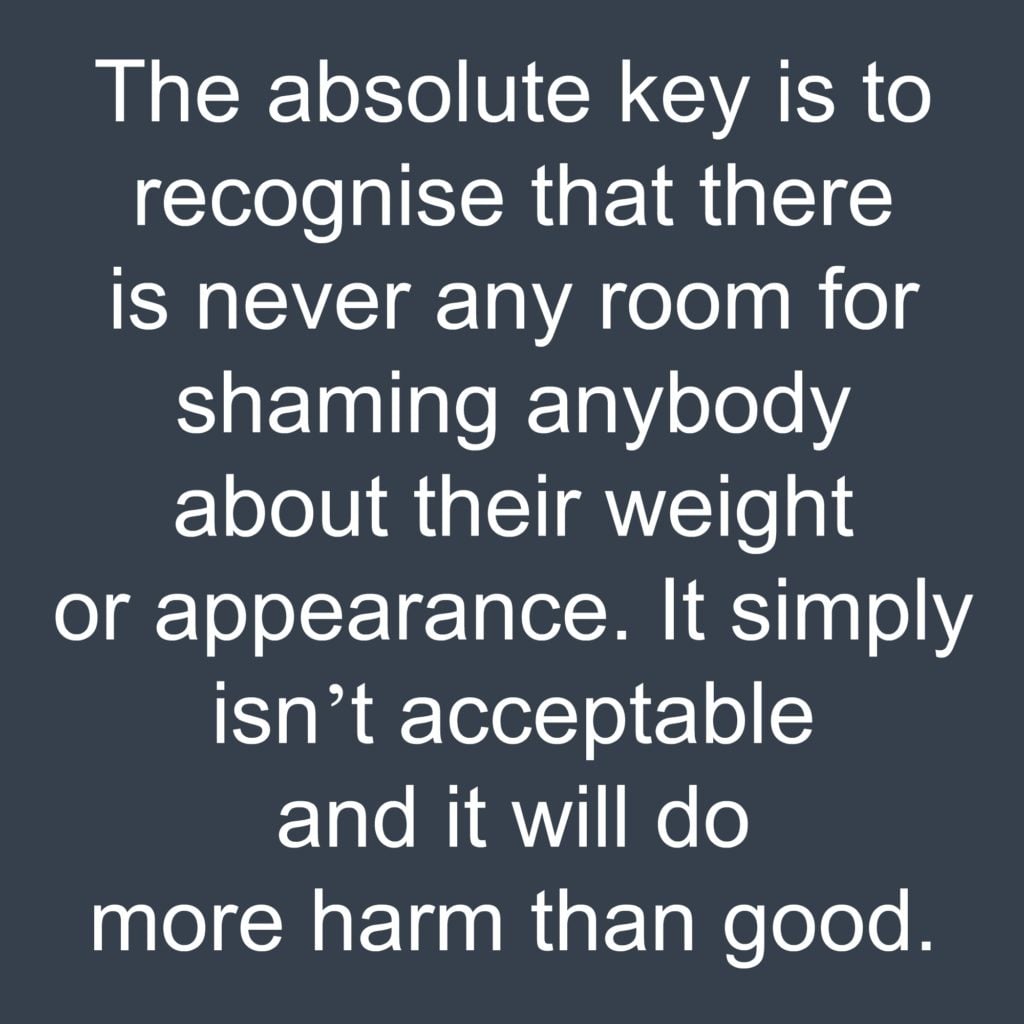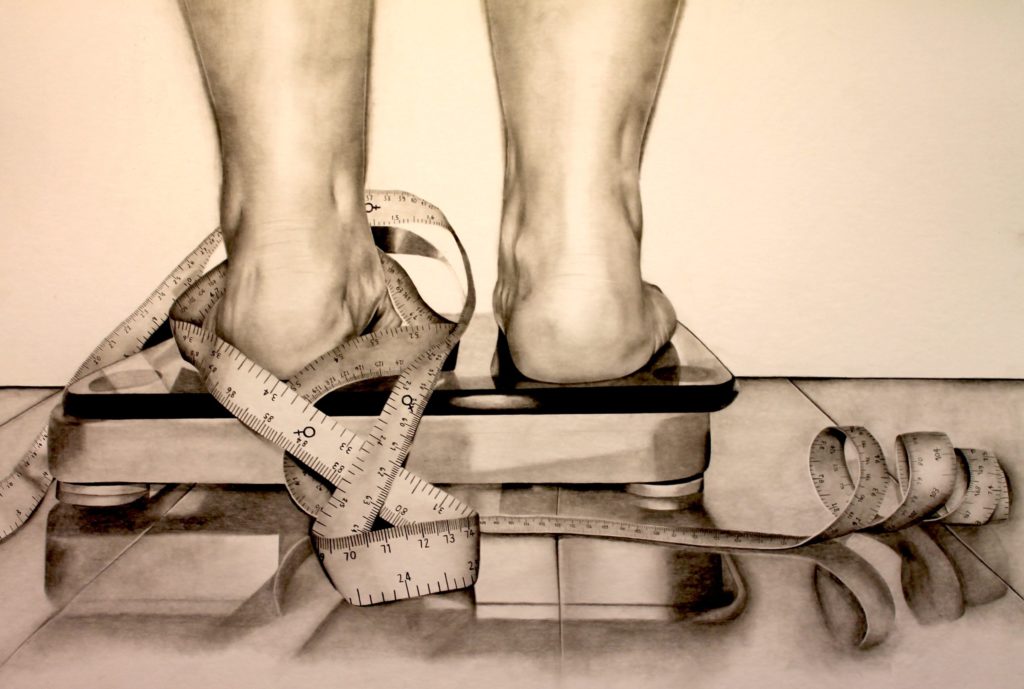Talking to children about weight gain and health without body-shaming is difficult. There is very little language available to serve us well. So what should we say?
My teenage daughter is overweight. I’m worried about her health but I don’t want to damage her self-esteem by drawing attention to it. What do I do?
This was a question that came out of a recent parent forum on diet and body image. It was overwhelmingly the concern most parents in the room had in regard to their children’s eating behaviour. In following up on this question with health and diet professionals, it became very clear to me that it is an area where we have very little useable language.
There is so much advice out there about girls’ self-esteem and body image. Most of it boils down to this simple message…Don’t talk to your daughter about her body. Talk to her about her talents, her personality or her abilities. Obviously, the same applies to boys.
That is an important message and yes, we definitely need to take the focus away from kids’ appearances. But what about their health?
Is it possible to talk about obesity with children without damaging their self-esteem? Is it even necessary to talk about weight at all in a discussion about health?
First of all, you need to be sure there really is a problem. It is important to acknowledge that some weight gain in adolescence is normal.
Expected Weight Gain
1. Puberty
Puberty is triggered by the release of GnRH (gonadotropin-releasing hormone). It signals to the adolescent body to get ready for reproduction. A girl will gain an extra layer of fat particularly settling on thighs, breasts and hips. This can be concerning for a parent who has always seen their child as lean, but it is normal.
2. Growth Spurts
A large percentage of height growth happens in adolescence and this must be supported by weight gain. The increase in weight and height don’t always happen at the same time, just as with babies and toddlers. Your tween or teen may seem heavier at times and then very lean at others.
Changes That Cause Weight Gain
1. Less Movement
Head of Physical Education at Santa Maria College, Anita Skelton, says that her staff notice an increase in weight in students in Year 7. She says this can be accounted for by a change in behaviour at recess and lunchtime. In primary school, students typically run around and play during breaks. In high school, students tend to sit and socialise. That means at least 40 minutes a day less physical exercise. That has to take its toll. While socialising, teens will often eat, compounding the impact.
2. Greater Access to Food
As they grow older we are less prescriptive about what children eat and they become more autonomous about food decisions. Often, they will prepare their own meals and may make poor choices. If a teenager has their own job or an allowance from their parents, they have the means to buy food of their choice.
3. Medical Issues Can Cause Weight Gain
If you are unable to account for your child’s weight gain, it is worth consulting your GP. There are a number of medical conditions that could be responsible for changes including thyroid problems, diabetes or steroid treatment, depression and stress.
Are you projecting your own body image concerns?
Your attitudes and body image will play a large role in the way you perceive your child’s body. If you are overly concerned with your appearance or weight, it is inevitable that you will judge your child by those standards. Please don’t. Deal with your own self-image first. Avoid niggling comments like:
- Are you sure you need to eat that?
- Have you weighed yourself today?
- You look a bit chunky in those pants
- You’ve got my thighs
Be aware that your perceptions of what is a healthy weight are largely determined by a media industry that makes money out of frightening people into buying diet books and weight-loss programs. Even the BMI (Body Mass Index) is considered outdated because it does not take into consideration muscle mass. We can afford to relax a little and not buy into the body-beautiful hysteria.
What About Kids’ Health?
All of this said, there is a point where a child is carrying too much weight for their health and wellbeing. If you’re not sure where that point is, talk to someone with expert knowledge; a dietitian or doctor.
Santa Maria College School Nurse, Lil Barrie, is also an Intensive Care and Coronary Care Nurse. She says, we are right to be concerned about kids’ self-esteem, but we must remember that “Obesity comes at a cost to your health, particularly if you have a family history of diabetes, heart disease or stroke. It also comes at a cost to mental health and self-esteem”.
She says, “1 in 3 Australians are morbidly obese, 2 in 3 are overweight, so we have reached the point where we need to talk about weight as a health issue.” It is a matter of finding the right language.
Swan Centre dietitian, Emily Eaton adds that weight must not be the only indicator of poor health. She gives the example of siblings with the same eating habits and exercise routines who are different body sizes. We are much more inclined to worry about the health of the child in the larger body, but the health of both children clearly needs to be addressed. “There needs to be concern at any weight as well as acceptance at any weight.”

How To Talk To Children About Weight Gain
When talking to children about weight gain, don’t mention appearance or attractiveness at all. It isn’t relevant. You are talking about a health issue and so keep the conversation focused on health.
Focus on the benefits of movement and nutrition rather than on weight. Remember too that if your child has a weight issue, they are probably already aware of it. You don’t need to labour the point.
The following examples might seem completely wrong for you and your family, so obviously put them into your own language. If you have any other motivation than health, don’t say anything at all.
- “Our family has a history of heart disease/diabetes so we all need to make sure we look after our bodies and have good eating habits. How can we all start to eat more healthily.”
- “I’ve noticed you’re not as active as you used to be. I want to be more active too, What could we do together?”
- “I’m concerned about your health and you don’t seem happy. What do you think would improve your health so that you feel better?”
- “Your eating habits aren’t healthy. How could we address that?” (Equally applicable to unhealthy eater of any size)
- “I’ve noticed you change your eating patterns according to how you are feeling. Let’s choose some healthier options for the shopping list.”
Finally…
The absolute key is to recognise that there is never any room for shaming anybody about their weight or appearance. It simply isn’t acceptable and it will do more harm than good.
Emily Eaton says, “Sometimes parents need to trust that the best thing they can do is provide a supportive home environment where a child feels worthy of love, irrespective of their size, weight or shape and not discriminated against or judged.”
Artwork by Emma Parr.
With thanks to the Swan Centre, Western Australia







